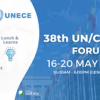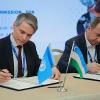News
Displaying Results 51 - 75 of 101
Public-Private Partnerships (PPPs) have become one of the preferred mechanisms for financing the Sustainable Development Goals (SDGs) in many countries in the UNECE region. Through its approach to PPPs for the SDGs, UNECE supports countries identifying, developing and implementing infrastructure…
Embracing sustainable infrastructure that is green, circular, inclusive, resilient, fiscally sustainable, and of high quality is crucial for meeting the Sustainable Development Goals (SDGs). Public-Private Partnerships (PPP) can promote the development of such infrastructure projects by putting…
Recent disruptions of supply chains have exposed fragilities in the current trading system and brought to light the importance of resilience and transparency in global trade.
UNECE and other international organizations play a crucial role in supporting countries (including both the public and…
The textile industry is a key driver of Uzbekistan’s economy, reflected in the country’s rank as sixth largest cotton producer in the world. In 2021, the country accelerated the battle against its child and forced labor violations in cotton harvest according to a new International Labour…
Infrastructure investment is long-term in nature and can lay the foundations for sustainable development in member States. To improve the sustainability of infrastructure and public services, such investments must be aligned with the Sustainable Development Goals (SDGs) says the United Nations…
As supply chains within the garment and footwear sector are becoming increasingly complex, the need for transparency is more relevant than ever. Consumers, investors and shareholders are pressing for transparent business activities as well as the prevention and mitigation of risks in value chains,…
Global trade has been transformed repeatedly throughout history, driven by new business processes and new policies. The new advances in digitalization now promise further transformation by making it faster, more transparent, reducing risks of red tape and corruption. With the increase in global…
Over 60 participants worldwide joined the online roundtable organized by the UN Digital transformation group for Europe and Central Asia (DTG4ECA) in the framework of the Regional Forum on Sustainable Development for the UNECE region. Established in May 2020, DTG4ECA group, co-chaired by UNECE and…
Strengthening value chains between Africa and the European Union (EU) is a priority objective for sustainable growth and decent jobs across the two continents. Recent market imbalances and disparities, involving supply chain disruptions and lack of attention to the social and environmental impacts…
The global economy enters 2022 with new challenges. Almost two years into the Covid-19 pandemic the digitalization of transport and trade data flows is on top of the economic agenda. In response, UNECE organized its 4th workshop on trade facilitation, Single Window, and data sharing for the Western…
Since its independence, Armenia has been one of the fastest-growing economies among the countries in Eastern Europe and South Caucasus (EESC) with GDP growth averaging 6 percent during the last two decades. Fueled by substantial reforms and increased foreign investment, the country embarked on a…
Trade facilitation is a key priority for Kyrgyzstan and its trading community for participation in the global and regional trading system. Under the project on “Strengthening the capacity of the Kyrgyzstan National Trade Facilitation Council to implement the WTO Trade Facilitation Agreement”, UNECE…
Complex global value chains include production facilities scattered all over the world. Sometimes, they may also involve practices of illegitimate subcontracting and undeclared informal work. In fact, their complexity and opacity make it very hard to gain accurate information about how and where…
Transitioning towards a knowledge-based economy away from a resource-intensive model of economic growth is central for sustainable development among the seven countries of the UN Special Programme for the Economies of Central Asia (SPECA) - Afghanistan, Azerbaijan, Kazakhstan, Kyrgyzstan,…
As world leaders gather in Glasgow for COP 26, there is increasing recognition that the transition to renewable energy is vital to tackle climate change. The circular economy aims at sustainable production, consumption and resource use by minimizing pollution, turning waste products into productive…
As all eyes turn to Glasgow where world leaders have gathered at COP26 for crucial negotiations to cut greenhouse gas (GHG) emissions and limit global warming, UNECE experts highlight how improved transparency and traceability could be part of the solution. The private sector has a vital role to…
The Group of 7 nations (G7), six of which are UNECE member States (Canada, France, Germany, Italy, the UK and the US), took bold step towards reducing barriers to trade by agreeing on the principles to govern cross-border data use and digital trade. At their meeting in London on 22 October,…
A decade after independence, Armenia embarked on a radical reform path to create a vibrant, market economy – triggering substantial economic growth, often reaching double digits.
As recent trends and volatility indicate, sustaining such growth requires addressing a range of structural challenges…
The COVID-19 pandemic restrictions have brought the benefits of paperless trading to the forefront of attention. Many countries are considering issuing, accepting and exchanging electronic documents for paperless trading. Issues related to paperless trading are also at the core of World Trade…
Since their independence, countries in Eastern Europe and the South Caucasus (EESC) – Armenia, Azerbaijan, Belarus, Georgia, the Republic of Moldova and Ukraine – have introduced far-reaching reforms to boost innovation and benefit from the potential of the growing knowledge-based economy.…
The need to digitalize information flows in international supply chains became clearer than ever during the pandemic, thanks to the reduced person-to-person contact this allows, on top of important efficiency gains. However, efforts to date have been fragmented. UNECE and its subsidiary body UN/…
With the UN Food Systems Summit taking place next week under the auspices of the UN General Assembly (23 September 2021), we must recognize that the food systems we have built over recent decades are unsustainable. The food choices we make every day as consumers and producers of food are having a…
The new UNECE Guide on producing CPI under lockdown, published today, helps national statistical offices to produce the Consumer Price index (CPI) under periods of lockdown and other emergencies.
The Consumer Price Index, or CPI, is a key economic indicator in most countries, giving a …
A coordinated response is necessary for promoting and implementing the circular economy agenda globally. Concrete commitments from governments, businesses, international organizations, civil society and other stakeholders will be key to building the sustainable, resilient and low-carbon economy…
UNECE is deepening its support to help countries of the region capitalize on innovation to recover from the pandemic and realize the ambitious vision of the 2030 Agenda.
The UNECE Innovation for Sustainable Development Review (I4SDR) of Uzbekistan, which is currently underway, will set out…


























